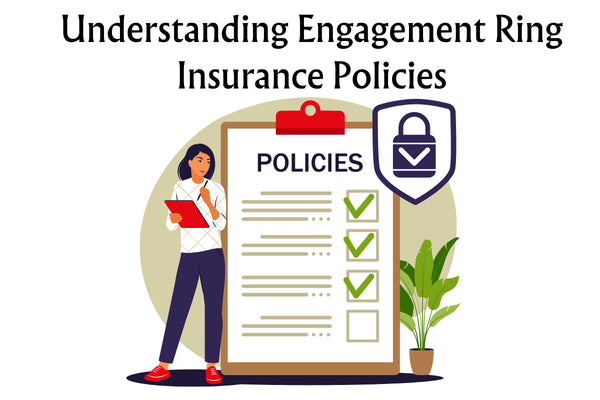
Engagement Ring Insurance | How to Insure Your Engagement Ring?
Table Of Contents
- Introduction to Engagement Ring Insurance
- Evaluating Your Ring's Value
- Understanding Engagement Ring Insurance Policies
- The Nitty-Gritty of Diamond Ring Insurance
- Types of Engagement Ring Insurance Coverage
- Coverage Inclusions and Exclusions
- Choosing the Right Insurance Provider
- Engagement Ring Insurance Cost: A Deeper Dive
- Conclusion
- FAQ: How to Insure Your Engagement Ring?
Introduction to Engagement Ring Insurance
Ah, the sparkle of a diamond, the glimmer of gold! An engagement ring isn't just a piece of jewelry. It holds stories, memories, and a promise of forever. Given its importance both sentimentally and financially, ensuring its safety is paramount. You've perhaps heard of car insurance, health insurance, but did you know there's something called engagement ring insurance? Yes, you read that right! It's a safeguard for that precious token of love. But how does one navigate the world of diamond ring insurance?
Evaluating Your Ring's Value
Before diving into the intricacies of engagement ring insurance, it's essential to understand your ring's value. We're not just talking about its price tag. A ring's value comprises its intrinsic worth, the craftsmanship, the quality of the diamond or other gemstones, and even the brand.
Professional Appraisal: To start, get your ring professionally appraised. An appraisal will offer a detailed description of the ring, including the cut, carat, clarity, and color of the diamond. It provides an estimated replacement cost which is crucial for diamond ring insurance.
Receipts and Certificates: Always keep the original purchase receipt and any gemstone certificates safe. These documents can further validate your claim regarding the ring's value.
Understanding Engagement Ring Insurance Policies

So, you've got the value locked down. Now, it's time to understand the types of engagement ring insurance available.
Stand-Alone Policies: Some companies specialize in jewelry insurance, offering stand-alone policies just for your bling. This is particularly useful if you want comprehensive coverage, from theft to accidental damages.
Homeowner's or Renter's Insurance: Often, you can add a special personal property endorsement or "floater" to your existing homeowner's or renter's insurance. This ensures that your engagement ring is covered outside common perils like theft.
The Nitty-Gritty of Diamond Ring Insurance
Getting insured is not just about paying premiums. It's about understanding what you're covered for.
Coverage Scope: Does your engagement ring insurance cover theft, damage, accidental loss, or just specific incidents? Knowing the scope is essential.
Replacements: If you were to claim your insurance, would the company pay you in cash or require you to purchase a replacement through a specified jeweler?
Premium Factors: The cost of your premium might depend on where you live, the ring's value, and the coverage type.
Types of Engagement Ring Insurance Coverage
The world of insurance can be a bit overwhelming, especially when you're ensuring something as sentimental and valuable as an engagement ring. So, let's break down the basics.
Jewelry Riders on Homeowner's or Renter's Policies: Many people don't realize that their homeowner's or renter's insurance might already offer some form of coverage for their jewelry. By adding a jewelry rider or floater to your current policy, your engagement ring can be covered. It's one of the best engagement ring insurance options for many, as it's straightforward and ties in with insurance you already have.
Specialized Jewelry Insurance: Think of this as a VIP service for your ring. Companies specializing in jewelry insurance typically offer more comprehensive coverage, catering to the specific needs and concerns that come with insuring a precious gem. These policies might cover scenarios that standard homeowner's or renter's policies don't.
Travel Insurance with Jewelry Coverage: If you're planning a destination proposal or simply love traveling with your bling, consider travel insurance policies that offer coverage for jewelry. It's a great way to ensure that your ring is protected, even miles away from home.
Coverage Inclusions and Exclusions
Knowing what's covered (and what's not) is crucial when selecting the best engagement ring insurance. While policies vary, here are some general inclusions and exclusions to be aware of:
Inclusions:
Theft: It's reassuring to know that if your ring is stolen, your insurance has got you covered.
Accidental Loss: Accidents happen. Whether it's slipping off at the beach or getting lost during a move, many policies will cover the unintentional loss of your ring.
Damage: From chipped stones to bent prongs, insurance can cover repairs or replacements.
Natural Disasters: Some policies even cover losses due to events like fires, floods, or earthquakes.
Exclusions:
Wear and Tear: Like all things, rings can show signs of wear over time. However, most policies won't cover damages from everyday use.
Unspecified Incidents: Some policies have clauses that exclude coverage for losses in unspecified circumstances. Always read the fine print.
Policy Limits: Every insurance policy has its limits. Ensure that the maximum coverage amount aligns with the value of your ring.
Travel Restrictions: If you're a globetrotter, double-check if your insurance covers losses overseas. Some might not.
Choosing the Right Insurance Provider
When it comes to insuring that stunning ring, it's not a one-size-fits-all affair. You need a provider who understands your unique needs and offers coverage tailored to your precious jewel. Here's a comprehensive guide to making that choice:
- Comprehensive Coverage: Your engagement ring is vulnerable to various risks - theft, damage, or even misplacement. Ensure that your insurance provider offers coverage for all these scenarios. A good policy is one that replaces your ring in cases of theft, repairs it if damaged, or compensates you adequately if lost.
- Ring Appraisals: Regular appraisals are essential to ensuring that your ring's insurance value remains up-to-date. Over time, the market price of diamonds and precious metals fluctuates. A good insurance provider should recognize this and offer periodic appraisals to adjust the coverage value.
- Understand the Claims Process: Dive deep into how claims are handled. Will they give you cash, or will they replace the ring? If they replace, will you be restricted to specific jewelers? Knowing these details beforehand can save a lot of headaches later.
- Check Reviews: Trust is paramount. Before finalizing your choice, delve into customer reviews. They give you genuine feedback on the provider's claim settlement process, customer service, and overall reliability.
- Assess the Engagement Ring Insurance Cost: Cost plays a crucial role in your decision. While it's essential to ensure your ring, it shouldn’t burn a hole in your pocket. Compare policies, understand what they offer vis-à-vis their cost, and choose one that provides the best value for your money.
Engagement Ring Insurance Cost: A Deeper Dive
Let's take a moment to delve deeper into the secondary keyword: engagement ring insurance cost.
The cost of insuring your engagement ring largely depends on its appraised value. Typically, for a ring valued at $5,000, you might pay between $50 and $80 per year. However, this can vary based on several factors:
- Location: Rates can differ depending on where you live. Urban areas, with higher theft rates, might have higher insurance costs than rural areas.
- Deductible: Just like any insurance, if you opt for a higher deductible, your annual premium might be lower.
- Policy Add-ons: Additional coverages, like for traveling abroad, can increase your premium.
Always ensure that the engagement ring insurance cost aligns with the coverage you're getting. Sometimes, paying a little extra is worth the peace of mind it brings.
Conclusion
Insuring your engagement ring is a blend of pragmatism with sentimentality. In the whirlwind of emotions and preparations, it’s a step that can often be overlooked. However, this small step can save you from significant heartache and financial setback in the future. By choosing the right insurance provider and understanding the engagement ring insurance cost, you not only protect a piece of jewelry but also the beautiful memories it embodies. As you move forward on this journey, remember, it's not just about protecting a monetary investment but safeguarding the symbols of love and commitment.
FAQ: How to Insure Your Engagement Ring?
Navigating the exciting world of engagement rings is thrilling, but amidst the sparkle and romance, there's the serious matter of engagement ring insurance. With the importance and value of such a precious item, ensuring its protection becomes paramount. Here, we dive deep into the process of securing the best insurance for your beloved ring. Let's clear up some common queries:
- Why should I consider engagement ring insurance?
Because accidents happen! Whether it's loss, theft, or damage, an engagement ring can be at risk. With engagement ring insurance, you get peace of mind knowing that your significant investment is protected.
- Is diamond ring insurance different from engagement ring insurance?
Generally speaking, the terms are used interchangeably. However, diamond ring insurance might focus specifically on the diamond, while engagement ring insurance can cover the entire ring including the band and other gemstones. Always clarify the details with your insurance provider.
- How much does engagement ring insurance cost?
Engagement ring insurance cost can vary based on the value of the ring, where you live, and the type of coverage you choose. Typically, you can expect to pay $1 to $2 for every $100 of your ring's replacement value annually. So, for a $10,000 ring, you might pay between $100 to $200 per year.
- What's the best engagement ring insurance out there?
The best engagement ring insurance is subjective and depends on individual needs. Some look for comprehensive coverage that includes accidental damage or loss, while others might only want theft protection. Do thorough research, read reviews, and perhaps consult with a jewelry expert to determine which insurance provider offers the best fit for your requirements.
- How do I get my ring appraised for insurance purposes?
Most insurance companies require a recent appraisal or a receipt of purchase. For an appraisal, consult with a certified gemologist or a jewelry appraisal expert. They'll provide a detailed report on your ring's value, which you can then present to the insurance company.
- Can I add my engagement ring to my existing home or renters' insurance?
Yes, you can often add your engagement ring as a "rider" or "floater" to an existing home or renter's insurance policy. This extends the policy's coverage to include specific valuable items like your ring. However, be sure to clarify the specifics of the coverage, as it might differ from standalone engagement ring insurance policies.
- What should I be looking out for in the fine print?
When selecting the best engagement ring insurance, be wary of limitations. Some policies might only cover theft but not accidental loss. Others might not cover repairs or might only insure you up to a certain amount. Always read the fine print and ask questions to fully understand your coverage.
- How often should I re-appraise my ring?
Given that the value of gemstones and metals can fluctuate, it's recommended to have your ring appraised every 2-5 years. This ensures that your engagement ring insurance reflects its current market value, so you're neither over-insured nor under-insured.
- In case of a claim, will I get cash or a replacement ring?
This depends on the policy. Some insurance providers offer a cash payout, while others might replace the ring or offer repairs through a jeweler of their choosing. It's crucial to know this beforehand to avoid surprises later.
- How can I reduce the cost of my engagement ring insurance?
Just like other insurance types, higher deductibles can reduce your premium. Also, security measures like using a safe or having a home security system might qualify you for discounts. Check with your insurer for potential discounts and ways to save.
Leave a comment
Please note, comments must be approved before they are published.









